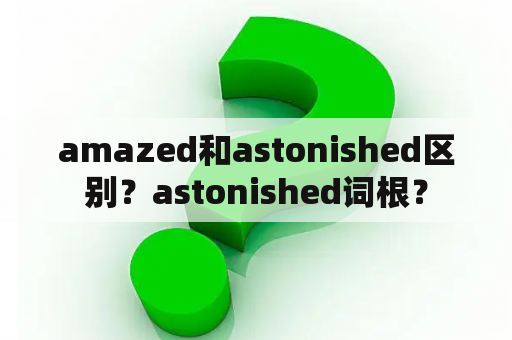amazed和astonished区别?astonished词根?
接名词、代词或以现在分词充当补足语的复合宾语。(使)害怕过去式 astonished过去分词 astonished现在分词 astonishing第三人称单数 astonishes双语例句:I was astonished at his excellent speech.我对他的出色演讲感到惊讶。amazed和astonished区别?
amazed的意思是:大为惊奇;使惊奇;使惊愕;使惊诧,例句:We were amazed by his generosity.他的慷慨令我们喜出望外。

astonished的意思是:惊讶的例句:was astonished at the news.这消息着实让我吃了一惊。
surprised用作形容词,还可作动词,其宾语常是人称代词。接名词、代词或以现在分词充当补足语的复合宾语。astonished是动词astonish的过去分词和过去式,用作形容词、动词,在句中可用作定语或表语。
astonished词根?astonished的词根:
astonish
美 /əˈstɑːnɪʃ/
英 /əˈstɒnɪʃ/
v.
(使)惊讶;(使)害怕
过去式 astonished
过去分词 astonished
现在分词 astonishing
第三人称单数 astonishes
双语例句:
The news of Stan Lee's death astonished me.
斯坦·李去世的消息令我大吃一惊。
I was astonished at his excellent speech.
我对他的出色演讲感到惊讶。
astonish动词名词形容词副词的区别和用法?1. astonish v. to surprise somebody very much使大为惊奇,使惊愕
例如:It astonished him that she had changed so little.
他很惊讶,他几乎没怎么变。
Her reply astonished me.
她的回答让我大吃一惊。
2. astonished adj. very surprised about something非常吃惊的,惊讶的
例如:We were astonished to find the temple still in the original condition.
我们惊讶地发现寺庙还是原来的样子。
I was a donut by the result.
这结果让我很惊讶。
3. astonishing adj. so surprising that it is difficult to believe令人惊讶的
例如:their astonishing success
他们惊人的成功
an astonishing decision
令人惊讶的决定
4. astonishment n. complete surprise惊异,惊讶
例如:She stared at him in astonishment.
她吃惊地看着他。
5. astonishingly adv.意思和上面ed形式形容词的意思差不多。
例如:an astonishingly good voice
令人惊叹的好嗓子
(astonishingly作副词修饰形容词good)
be astonished at 和with区别?1. 区别在于be astonished at表示“对某事感到惊讶”,而be astonished with则表示“因为某事而感到惊讶”。
2. 原因在于at和with在语法上有不同的用法,at通常用于表示目标或对象,而with则表示原因或伴随状态。
3. 除了astonished之外,还有其他的形容词可以搭配at或with,例如surprised、amazed、pleased等,需要根据具体语境来选择正确的搭配。
同时,在英语中,正确使用介词也是非常重要的,需要多加练习和注意。
